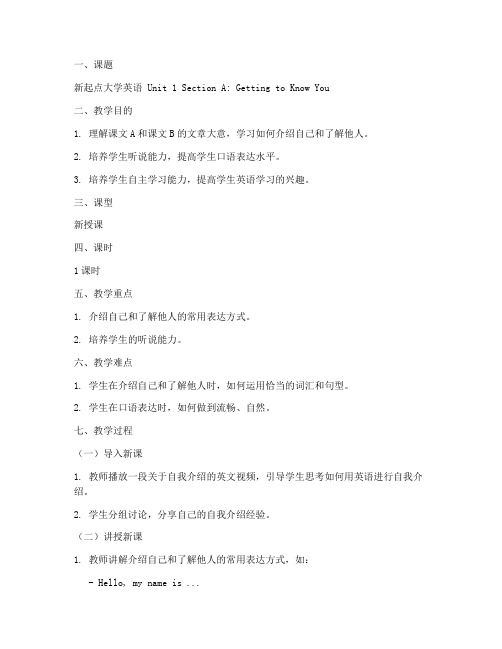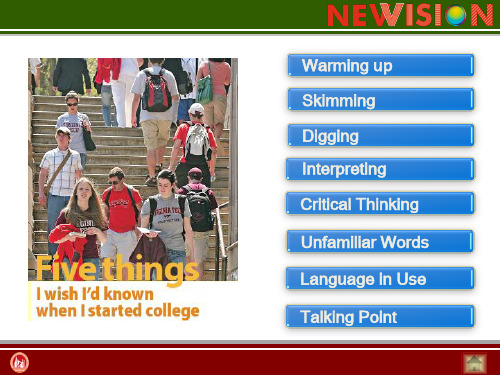新起点大学英语第一册Unit 1
新起点英语教材答案大学

新起点英语教材答案大学第一单元:单词与词组本单元目标:学习并掌握本单元的单词与词组,为后续学习打下基础。
1. keyboard - 键盘2. dictionary - 字典3. textbook - 教科书4. laptop - 笔记本电脑5. notebook - 笔记本6. highlighter - 荧光笔7. pencil - 铅笔8. pen - 钢笔9. eraser - 橡皮擦10. calculator - 计算器第二单元:语法与句型本单元目标:学习并掌握本单元的语法与句型,能够正确运用于口语和书面表达中。
1. What do you do? - 你是做什么的?2. I am a student. - 我是学生。
3. What does he do? - 他是做什么的?4. He is a teacher. - 他是教师。
5. Where do you work? - 你在哪里工作?6. I work in a hospital. - 我在医院工作。
7. Where does she study? - 她在哪里学习?8. She studies at a university. - 她在大学学习。
9. How do you go to work? - 你怎么去上班?10. I go to work by bus. - 我坐公交车去上班。
第三单元:阅读与理解本单元目标:通过阅读与理解文章,培养学生的阅读理解能力。
阅读理解一:Sara is a student. She is from China. She is studying English at a university in the United States. Sara is a hardworking student. She goes to the library every day and reads books in English. She listens to English songs and watches English movies to improve her listening skills. Sara also practices speaking with native English speakers. She wants to become fluent in English and use it in her future career.问题1:Where is Sara from?问题2:What does Sara do to improve her listening skills?问题3:What is Sara's goal?阅读理解二:Tom is a businessman. He travels to different countries for his job. Every time he arrives in a new country, he learns some basic phrases in the local language. He believes that learning the local language helps him to communicate better with the local people and understand their culture. Tom enjoys learning new languages and finds it very rewarding.问题1:What does Tom do for a living?问题2:Why does Tom learn the local language when he travels?问题3:How does Tom feel about learning new languages?第四单元:口语与对话本单元目标:通过模拟对话,提高学生的口语表达能力。
新起点大学基础英语教程读写教程1unit1

新起点大学基础英语教程读写教程1unit1<<新起点大学基础英语教程1>>教学大纲一、说明(一)教学目的与要求:通过让学生学习英语,培养学生一定得听说读写能力和阅读能力,使他们用英语基本交流,这本教材能够很好的帮助学生,掌握良好的语言学习方法,打下扎实的基础。
(二)教学重点与难点第一章:掌握本单元的单词,巩固加深基本语法知识。
第二章:阅读一般难度的文章,掌握中心大意,并具有一些判断,推理,分析能力。
第三章:听懂英语讲课,并能能够熟悉教材,了解简单的句子。
第四章:在教材内容中的听答能进行复述,能用英语正常交流。
第五章:掌握生单词和课文大意,能适当的翻译句子。
第六章:能借助词典将略低于英语短文翻译成中文,理解正确,译文答译。
第七章:掌握本单元新单词,课文,能完成课后练习。
第八章:对本章所将的课文能进行简单的英文发言。
第九章:提高在语篇水平上运用语法知识的能力。
第十章:通过概括性的练习帮助学生对课文进行宏观分析,掌握中心思想。
(三)教学方法与改革精髓教学方法:课堂教学改变传统的以教师讲授为主的单一课堂教学模式,积极采用新的教学方法,真真体现英语教学的实用性,文化性和趣味性的融合,使英语教学朝着个性化,自主式学习方向发展,语言能力语法能力得到提高,是英语课程教改的重点。
(四)总学时(五)学分(六)开课学期第一学期二.教学内容和学时分配(一)教学内容Unit1:How to study English(1)Unit1:How to study English(2)Unit2:From Trash to TreasureUnit3: The Best Teacher I Ever HadUnit4: Audrey HepburnUnit5:Sports Around the WorldUnit6:A Nice Cup of TeaUnit7:Bring Your PC to CollegeUnit8:Icehotel Attracts TouristsUnit9:How to Cope with StressUnit10:Banking Services三.教材与参考书目(一)教材:<<新起点大学基础英语教程>>总主编:杨治中主编:王海啸外语教学与研究出版社(参考书目):教育部制定的《新起点大学英语课程教学大纲》。
大学英语新起点1教案

#### 一、课程信息课程名称:大学英语新起点1教材:新起点大学英语综合教程1授课对象:大一新生授课课时:2课时#### 二、教学目标1. 知识目标:- 掌握基本的英语字母、单词和短语。
- 理解并运用简单的英语句型。
2. 技能目标:- 培养学生的听说读写能力。
- 提高学生的英语交际能力。
3. 情感目标:- 激发学生对英语学习的兴趣。
- 增强学生的自信心。
#### 三、教学内容1. Unit 1:Hello, My Name Is...- 学习自我介绍的基本句型。
- 了解西方国家的问候方式。
2. Unit 2:My Hometown- 学习描述家乡的词汇和句型。
- 了解不同国家的风土人情。
#### 四、教学过程##### 第一课时(一)导入新课1. 课堂问候:教师用英语问候学生,营造轻松的学习氛围。
2. 热身活动:学生用英语进行简单的自我介绍,教师给予反馈。
(二)讲授新课1. 词汇教学:- 介绍本课的生词,如:name, hometown, introduce, interesting, famous 等。
- 通过图片、例句等方式帮助学生记忆单词。
2. 句型教学:- 讲解本课的句型,如:Hello, my name is...;My hometown is...;It's interesting/famous...- 通过角色扮演等方式让学生练习句型。
(三)巩固练习1. 听力练习:播放与本课内容相关的听力材料,让学生回答问题。
2. 口语练习:学生分组进行对话练习,描述自己的家乡。
(四)小结1. 回顾本课所学内容。
2. 强调重点词汇和句型。
##### 第二课时(一)复习导入1. 回顾上一节课所学内容。
2. 学生用英语描述自己的家乡。
(二)讲授新课1. 词汇教学:- 介绍本课的生词,如:weather, family, school, study等。
- 通过图片、例句等方式帮助学生记忆单词。
新起点大学英语电子教案

一、课题新起点大学英语 Unit 1 Section A: Getting to Know You二、教学目的1. 理解课文A和课文B的文章大意,学习如何介绍自己和了解他人。
2. 培养学生听说能力,提高学生口语表达水平。
3. 培养学生自主学习能力,提高学生英语学习的兴趣。
三、课型新授课四、课时1课时五、教学重点1. 介绍自己和了解他人的常用表达方式。
2. 培养学生的听说能力。
六、教学难点1. 学生在介绍自己和了解他人时,如何运用恰当的词汇和句型。
2. 学生在口语表达时,如何做到流畅、自然。
七、教学过程(一)导入新课1. 教师播放一段关于自我介绍的英文视频,引导学生思考如何用英语进行自我介绍。
2. 学生分组讨论,分享自己的自我介绍经验。
(二)讲授新课1. 教师讲解介绍自己和了解他人的常用表达方式,如:- Hello, my name is ...- I come from ...- I'm a student at ...- I'm interested in ...- What about you?- I'm from ...- I study ...- I like ...2. 教师引导学生进行角色扮演,模拟介绍自己和了解他人的场景。
(三)巩固练习1. 学生分组进行自我介绍,其他同学提问,了解对方的个人信息。
2. 教师组织学生进行小组讨论,分享自己学到的介绍自己和了解他人的表达方式。
(四)归纳小结1. 教师总结本节课的重点内容,强调介绍自己和了解他人的常用表达方式。
2. 学生分享自己的学习心得,总结自己在本节课中的收获。
(五)作业布置1. 学生课后练习自我介绍,并用英语写一篇关于自己的短文。
2. 学生预习下一节课的内容,为下一节课做好充分准备。
八、板书设计1. 介绍自己和了解他人的常用表达方式2. 学生自我介绍示例3. 小组讨论成果展示九、教具1. 投影仪2. 白板3. 录音笔4. 学生自我介绍视频通过本节课的学习,学生能够掌握介绍自己和了解他人的常用表达方式,提高口语表达能力,为今后的英语学习打下坚实基础。
新起点大学英语 Unit 1:Active reading

Skimming
5 Why is it good to get the rhythm of the day right? You will have a balanced life with health, friends and success in your studies.
6 How old was the writer when he found a career? Late twenties/ nearly 30.
● I was very nervous before coming, but I am really enjoying everything. People are so friendly and helpful.
Warming up
2. Watch the two videos and answer some questions.
MP3 译文
1 Congratulations! You’ve worked hard and you’ve got to college. Your parents are really proud of you … relieved too, I guess.
2 So what happens now? College is the best place to broaden your horizons and the best time to meet people, to work hard, to play sports, to fall in and out of love, to find out about our great big world.
More
Warming up
新起点大学英语Unit1-Text A

Exercises
汉译英: 今晚的作业我打算先做英语练习。
Key: Of all the homework tonight, I’m going to start with English exercises.
Reading
BACK
… if you read a daily newspaper in any major city, you’ve read the equivalent of at least four books… 如果你每天看随便哪个大城市的一 份日报,那么你每天的阅读量至少相当于四本书。
Reading
BACK
译文
Para. 4
4 你是怎么看报纸的?你只看那些自己感兴趣的东西。你 是怎么知道的?因为报纸有不同的版面,如果你对体育感兴 趣,你只看体育版;如果你想了解商业信息,你只看商业版。 即使这样,你也不会看所有的体育报道或商务文章。报纸的 标题突出了文章的要点,这就方便了你的选择。另外,报纸 的写作格式也使你很容易了解要点。在每一个标题下面,你 通常都会看到综述要点的一段文字。这样,你便可以选择只 读综述或通读全文。
Chinese
Reading
4 And how do you read a newspaper? You read only those things you are interested in. And how do you know? Because newspapers are divided into sections, you only read the sports pages if you’re
3 If you answered the first question no, and the second yes, think again, if you read a daily newspaper in any major city, you’ve read the equivalent of at least four books.
新起点大学英语1_教案
一、课题《新起点大学英语1》第1单元二、教学目的1. 培养学生掌握基本的英语听说读写能力。
2. 使学生了解英语国家的基本文化背景。
3. 提高学生的英语学习兴趣,培养良好的学习习惯。
三、课型新授课四、课时2课时五、教学重点1. 基本词汇的掌握。
2. 基本句型的运用。
3. 基本语法知识的运用。
六、教学难点1. 词汇的记忆与运用。
2. 语法知识的灵活运用。
七、教学过程(一)导入新课1. 利用图片、视频等方式,激发学生的学习兴趣。
2. 通过简短的英语对话,引导学生复习已学知识,为新课做好铺垫。
(二)讲授新课1. 词汇讲解:讲解本单元重点词汇,并举例说明其在句子中的运用。
2. 句型讲解:讲解本单元重点句型,并引导学生进行模仿练习。
3. 语法讲解:讲解本单元重点语法知识,并结合例句进行讲解。
(三)巩固练习1. 词汇练习:通过填空、选择题等形式,巩固学生对本单元词汇的掌握。
2. 句型练习:通过仿写、改写等形式,提高学生对本单元句型的运用能力。
3. 语法练习:通过判断题、改错题等形式,巩固学生对本单元语法知识的运用。
(四)归纳小结1. 总结本单元所学内容,强调重点、难点。
2. 鼓励学生课后复习,巩固所学知识。
(五)作业布置1. 复习本单元所学词汇、句型和语法知识。
2. 完成课后练习题,提高自己的英语能力。
八、板书设计一、词汇1. basic2. important3. language4. communication5. skill二、句型1. This is a book.2. I have a pen.3. She is a teacher.三、语法1. be动词2. have/has3. 主谓一致九、教具1. 电脑、投影仪2. 课本、练习册3. 图片、视频通过本节课的学习,学生应掌握本单元的基本词汇、句型和语法知识,并能运用所学知识进行简单的英语交流。
同时,培养学生良好的学习习惯,提高英语学习兴趣。
新起点大学英语Unit1-Text B
大量的阅读为他的研究工作奠定了基础。
Exercises
汉译英: 战后良好的规划给这个国家的经济奇迹奠定了基础。
Key: Good planning after the war laid the foundations for the nation’s economic miracle.
Reading
2 萨默斯说,写作不仅在大学学习中起着重要的作用,作 为一种有力的工具,它能帮助学生“认识到自己是积极的参 与者,而且他们有能力从事他们所做的事情”。
Reading
BACK
译文
Para. 3~4
3 萨默斯于1987年来到哈佛大学,当时担任说明文写作教 学组副主任。到1993年任主任时,她将美国最早的大学写作 教学带入第三个百年。
Chinese
Reading
BACK
译文
Para. 1~2
写作:大学学习的基石
1 对于哈佛大学说明文写作教学组主任萨默斯博士和许多 学生而言,写作是大学学习的基石。哈佛大学所有一年级学 生都要上一个学期的说明文写作课。这门研讨课强调仔细的 阅读、校订和研究,是为学生们今后在哈佛所读的课程打基 础的一门课程。
大学英语新起点第一册 Unit 1 how to study English.ppt [恢复]
Text A —— Paragraph 4
You must learn to be an active rather than a passive student in class. Your teacher is not a mindreader: If you don’t understand something, he or she can’t know that unless you ask a question or ask for further explanation. You are helping the teacher by asking questions. You must take an active part in the learning process.
e.g. There was little communication between the old man and his son.
2. [pl.] 通讯系统 交通(工具) 通讯系统,交通 工具) 交通(
e.g. communications equipment 通信设备 communications technology 通讯技术
New words and expressions
communication common means abroad communicate tape magazine whatever reason purpose obstacle overcome could active passive explanation process concentrate translate imitate normal speed special unable
Text A —— Paragraph 1
新起点大学英语综合教程第一册教案unit 1
Unit 1Section A: Your First Night at SchoolTeaching Objectives:1. 理解课文 A 和 B 的文章大意,了解大学新生的心态和入校后的事宜。
2. 理解和正确运用重点词汇、短语和句型(真实条件句、否定句、疑问句)等。
3. 掌握长元音 /i:/ 和短元音 /I/ 的不同发音。
4. 学会正确使用不同的词性。
5. 了解对中国文化影响深远的儒家代表人物孔子及其思想。
Teaching Procedures:Part 1: Warm-up Activities1.Matching:Learn the following words and phrases about different places on campus, and matchthem to the pictures.2.Listen to the conversation. Then practice with your partner, using the words and phrasesprovided on the right.3.Background Information1. SATWith the idea of providing colleges and universities with one mon criterion that can be used to pare all applicants, the College Board has created SAT, which is an entrance exam used by most colleges and universities in the United States to make admissions decisions. There are three sections: Math, Critical Reading and Writing.2. NCAAThe National Collegiate Athletic Association (NCAA) is a non-profit association which regulates athletes of about 1,300 institutions. It also organizes the athletic programs of many colleges and universities in the United States and Canada, and helps more than 450,000 college student-athletes who pete annually in college sports. The organization is headquartered in Indianapolis, Indiana.Part 2: Text A: Your First Night at SchoolⅠ. Words and phrases1. survivev. continue to live normally and not be too upset by your problems 艰难度过I don’t think I could survive another year as a teacher; it’s just too stressful.我认为我没法再多做一年老师;这压力太大了。
- 1、下载文档前请自行甄别文档内容的完整性,平台不提供额外的编辑、内容补充、找答案等附加服务。
- 2、"仅部分预览"的文档,不可在线预览部分如存在完整性等问题,可反馈申请退款(可完整预览的文档不适用该条件!)。
- 3、如文档侵犯您的权益,请联系客服反馈,我们会尽快为您处理(人工客服工作时间:9:00-18:30)。
Unit OneTeaching Objectives:1.Grasp the main idea of Text A&B --- To know the purpose of learning Englishis helpful to study English well.2.Master important language points and grammatical points.3.Try to master basic English sentence patterns.4. Learn how to write Notice.Time Allotment:1~2 periods: Pre-reading tasks and Text A3~4periods: Exercises of Text A and New words of Text B5~6periods: Exercises of Text BText A How to study English (Ⅰ)1. Pre-reading Tasks1.1. Pre-reading questions1) What’s your purpose of learning English?2) How do you usually learn English (listening, speaking, reading and writing)?3) When you have some difficulties in English study, how do you deal with them?4) Do you think it’s losing face to make mistakes in speaking English?1.2. IntroductionThis unit is about English learning. This is an old topic. But can you tell me how to study English well? I think you can give me many, many answers, maybe some are from your own experience, some are from the books and still some are from your teachers or other people. Today I also want to give you two tips: the first one is Passio n and the second one is Effective learning methods, and passion is the more important one. Why? Because passion makes you want to learn English; learningmethods only tell you how to do it better. Just as an old saying goes: All roads lead to Rome. In English study, different people have different methods, but the methods must be effective. In this unit the author gives us some useful tips for our English study.2. While --Reading Tasks2.1. Read the passage quickly and finish Exercises A and B.2.2. Listen to the recording of the passage, and then ask some students to read inclass.2.3. Answer some questions based on the text.1) Why is English an important foreign language for Chinese students?Because it is a common means of communication in the world.2) According to the text, what is the greatest difficulty to overcome in Englishlearning?The fear for losing face.3) What is a mind-reader?A mind-reader is someone who knows what is in your mind.4) Is it good for Chinese students to translate English into Chinese sentence bysentence? Why?No, because then you’ll always think in Chinese.5) What is a good way to learn to speak English?By imitating other’s speaking at normal speed.2.4. Study the text in detail1) Learning a foreign language is for the purpose of communication ━Peoplelearn a foreign language because they want to communicate withothers.Learning a foreign language动名词(gerund)短语作主语e.g. Reading in bed is bad for your eyes.Helping others is helping yourself.▲purpose: n. aim, objective 目的,意图e.g. 1. Did you come to London for the purpose of seeing your family or forbusiness purpose?你到伦敦来的目的是为了要看望家人还是为了公事?2. Do you think I did it on purpose?on purpose: with a purpose故意地,有意地e.g. 1. She seems to do these things on purpose.2. She came to see you on purpose.▲communicate: v. --- t o give or exchange information or opinions/to convey one’s ideas, feelings, etc. clearly to others交流/传达e.g. I often communicate with my friends by email.●communication: n. the act or process of communicating.通讯,交往.e.g. 1.Radio and television are important means of communication.无线电和电视是重要的通信手段。
2. Language is a tool of communication.●communicative: a. related to communication. 交际的e.g. Communicative abilityLanguage is a communicative tool.2)▲make (good/full )use of: to use sth. In order to succeed in doing sth.e.g. We should make use of the chance.I make use of my spare time to work and learn.I make use of every precious minute.Make the best use of everything. 使物尽其用3)Whatever your reason, you need to remember that your purpose is to understand and make yourself understood.your purpose is to understand 动词不定式(infinitive)作表语(predicative)▲whatever: no matter what/everything or anything that 无论如何,任何事物e.g. Whatever happens, the first important thing is to keep cool.不管发生什么事,头等重要的是保持冷静。
You may do whatever you want to do. 无论你想做什么事,你都可以做。
They eat whatever they can find. 他们找到什么就吃什么?4)▲overcome: v. to successfully deal with or control 克服,战胜e.g. overcome difficulties.overcome one's shortcomings.5) You must learn to be an active rather than a passive student in class —You must learn to be an active and not a passive student▲active: ready to do things; able or ready to take action活跃的; 积极的e.g. She is very active in English class。
He is an active member of the club.他是俱乐部的积极分子。
